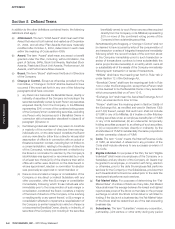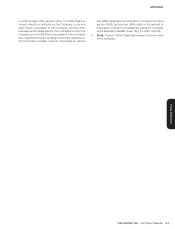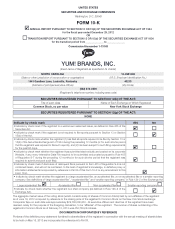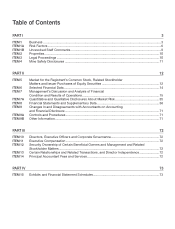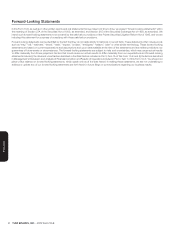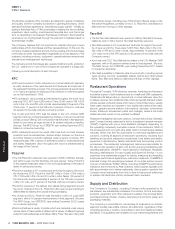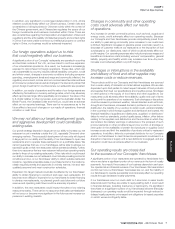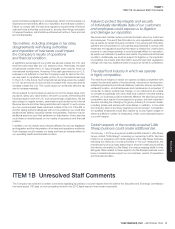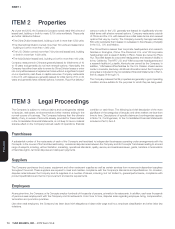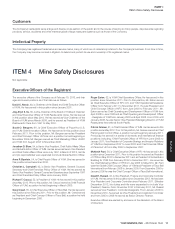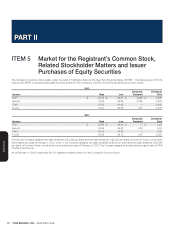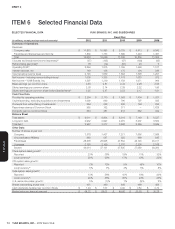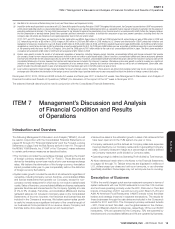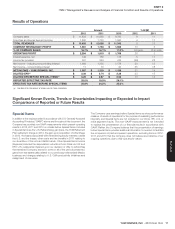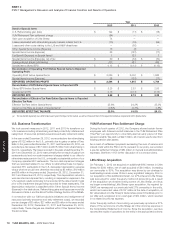Pizza Hut 2012 Annual Report Download - page 100
Download and view the complete annual report
Please find page 100 of the 2012 Pizza Hut annual report below. You can navigate through the pages in the report by either clicking on the pages listed below, or by using the keyword search tool below to find specific information within the annual report.
YUM! BRANDS, INC.-2012 Form10-K8
Form 10-K
PART I
ITEM 1ARisk Factors
We could be party to litigation
that could adversely affect us by increasing
our expenses or subjecting us to signifi cant
monetary damages and other remedies.
We are involved in a number of legal proceedings, which include consumer,
employment, tort and other litigation.We are currently a defendant in cases
containing class action allegations in which the plaintiffs have brought claims
under federal and state wage and hour, disability and other laws.Plaintiffs
in these types of lawsuits often seek recovery of very large or indeterminate
amounts, and the magnitude of the potential loss relating to such lawsuits
may not be accurately estimated.Regardless of whether any claims against
us are valid, or whether we are ultimately held liable, such litigation may be
expensive to defend and may divert resources away from our operations
and negatively impact reported earnings.With respect to insured claims,
a judgment for monetary damages in excess of any insurance coverage
could adversely affect our fi nancial condition or results of operations.Any
adverse publicity resulting from these allegations may also adversely affect
our reputation, which in turn could adversely affect our results.
In addition, the restaurant industry has been subject to claims that relate
to the nutritional content of food products, as well as claims that the
menus and practices of restaurant chains have led to the obesity of some
customers.We may also be subject to this type of claim in the future and,
even if we are not, publicity about these matters (particularly directed at
the quick service and fast-casual segments of the industry) may harm our
reputation and adversely affect our results.
Health concerns arising from outbreaks
of viruses or other diseases may have
an adverse effect on our business.
Outbreaks of Avian Flu have occurred in the past, and it is possible
that further outbreaks could occur and reach pandemic levels.Future
outbreaks could adversely affect the price and availability of poultry and
cause customers to eat less chicken, which could negatively impact our
profi t margins, sales and revenues.Widespread outbreaks could also
affect our ability to attract and retain employees.
Furthermore, other viruses such as H1N1 or “swine fl u” may be transmitted
through human contact, and the risk of contracting viruses could cause
employees or guests to avoid gathering in public places, which could
adversely affect restaurant guest traffi c or the ability to adequately staff
restaurants.We could also be adversely affected if jurisdictions in which we
have restaurants impose mandatory closures, seek voluntary closures or
impose restrictions on operations of restaurants.Even if such measures are
not implemented and a virus or other disease does not spread signifi cantly,
the perceived risk of infection or health risk may affect our business.
Our success depends substantially
on the value and perception of our brands.
Our success is dependent in large part upon our ability to maintain and
enhance the value of our brands and our customers’ connection to our
brands.Brand value is based in part on consumer perceptions on a variety
of subjective qualities, and even isolated business incidents can erode brand
value and consumer trust, particularly if the incidents receive considerable
publicity or result in litigation.For example, our brands could be damaged
by claims or perceptions about the quality of our products regardless of
whether such claims or perceptions are accurate.Consumer demand
for our products and our brand value could diminish signifi cantly if any
such incidents or other matters erode consumer confi dence in us or our
products, which would likely result in lower sales and, ultimately, profi ts.
Our results and fi nancial condition could be
affected by the success of our refranchising
program.
We are in the process of refranchising restaurants in the U.S., which has
reduced and is expected to continue to reduce the percentage of Company
ownership of KFCs, Pizza Huts, and Taco Bells in the U.S. Once executed,
the success of the refranchising program will depend on, among other things,
buyers effectively operating these restaurants, the impact of contingent
liabilities incurred in connection with refranchising, and whether the resulting
ownership mix of Company-operated and franchisee-operated restaurants
allows us to meet our fi nancial objectives.In addition, refranchising activity
could vary signifi cantly from quarter-to-quarter and year-to-year and that
volatility could impact our reported earnings.
Our business may be adversely impacted
by general economic conditions.
Our results of operations are dependent upon discretionary spending by
consumers, which may be affected by general economic conditions globally
or in one or more of the markets we serve.Some of the factors that impact
discretionary consumer spending include unemployment, disposable income
and consumer confi dence.These and other macroeconomic factors could
have an adverse effect on our sales mix, profi tability or development plans,
which could harm our fi nancial condition and operating results.
Changes in governmental regulations
may adversely affect our business operations.
Our Concepts and their franchisees are subject to numerous laws and regulations
around the world. These laws change regularly and are increasingly complex.
For example, we are subject to:
•
The Americans with Disabilities Act in the U.S. and similar state laws that
give civil rights protections to individuals with disabilities in the context
of employment, public accommodations and other areas.
•
The U.S. Fair Labor Standards Act, which governs matters such as
minimum wages, overtime and other working conditions, family leave
mandates and a variety of similar state laws that govern these and other
employment law matters.
•
Anti-bribery and corruption laws such as the Foreign Corrupt Practices
Act, the UK Bribery Act and similar laws.
•
New or changing laws and regulations relating to nutritional content,
nutritional labeling, product safety and menu labeling.
•New or changing laws relating to state and local licensing.
•
New or changing laws and regulations relating to health, sanitation, food,
workplace safety and fi re safety and prevention.
•
New or changing laws and regulations relating to union organizing rights
and activities.
•
New or changing laws relating to information security, privacy, cashless
payments and consumer credit, protection and fraud.
•New or changing environmental regulations.
•
New or changing federal and state immigration laws and regulations
in the U.S.
New laws or changes in law could result in increased taxes, and compliance
with new or existing laws and regulations could impact our operations. In
addition, the compliance costs associated with these laws and regulations
could be substantial, and any failure or alleged failure to comply with
these laws or regulations could increase our exposure to litigation and


